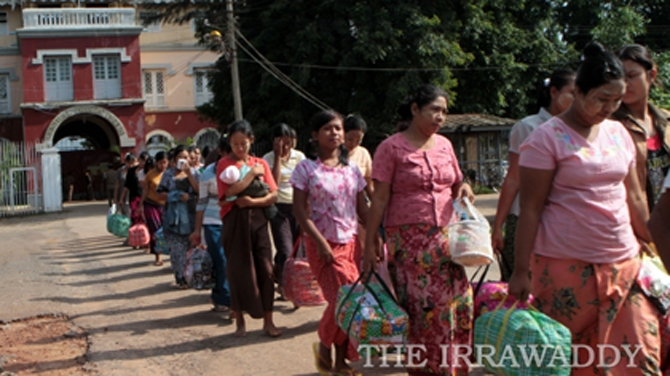US Congress to Assess Burma's Political Prisoner Issue

WASHINGTON—The status of political prisoners is likely to figure prominently in any consideration by the US Congress with regard to Burma, a congressional report has said, adding that Congress may choose to examine the political prisoner issue in Burma either separately or as part of a broader review of US policy towards Burma.
“Congress may also consider taking up legislation—on its own or in response to a request from the Obama Administration—to amend, modify, or remove some of the existing sanctions on Burma,” said the report on Burmese political prisoners by the Congressional Research Service (CRS).
As the name suggests, CRS is the independent bipartisan research wing of US Congress, which prepares periodic report in issues of interest for the lawmakers.
In its 17-page report, CRS said the political prisoner situation in Burma—as well as human rights in general—is likely to figure prominently in congressional consideration of US policy towards Burma.
“In the coming months, Congress may decide to examine the status of the implementation of existing US sanctions on Burma. It may also assess the political prisoner issue, either separately or as part of a broader consideration of human rights in Burma,” said the report, a copy of which was provided to The Irrawaddy.
“Congress may take up legislation to amend or alter US sanctions on Burma, depending on the evolving conditions in the country. In addition, the Obama Administration may ask Congress for additional funding for humanitarian programs in Burma to address the serious humanitarian needs of Burma’s internally displaced people [IDPs], refugees, and other vulnerable populations, and to foster desired political changes,” the report said.
Noting that existing US sanctions on Burma are based on several laws specifically focused on the country, as well as other laws that impose sanctions on nations that fail to comply with US standards of conduct related to specific issues, the report said the changing political situation in Burma may warrant congressional consideration of whether alteration or removal of sanctions should be considered under current law.
“Similarly, the [US] President has the authority to waive or suspend some of the existing sanctions on Burma if he determines that the necessary conditions have been met. If the President were to exercise this executive authority, Congress may choose to review the President’s determination,” it said.
The CRS said the Congress may decide that circumstances warrant consideration of new legislation related to US policy towards Burma. Such legislation could reflect a determination to play a more active role in the formation of US policy toward Burma, which is officially known as Myanmar.
“Alternatively, legislation may be considered in response to a request from the Obama Administration to amend existing laws to facilitate an adjustment in US policy,” it said, adding that the Congress may also be called upon to consider additional funding for humanitarian assistance to Burma.
It is possible that the President’s proposed budget for the fiscal will include a request for more funds for humanitarian projects inside Burma.
- 'My Wife Died From Police Abuse,' Says Husband
- US Says Observer Conditions Don't Meet Int'l Standards
- 159 Observers to Monitor Burma Election
- Govt to Address Breaches of SSA-South Ceasefire: Aung Min
- Burma Investors Pin Hopes on Seminal Sunday
- Malaysia PM Leads 50-Strong Delegation to Burma
- Rangoon Woman in Police Station Death Plunge
- Burmese Legal System Remains Tool of Govt: AHRC
- Burmese Army Chief Defends Political Role
- NLD Seeks Election Talks with KIO
